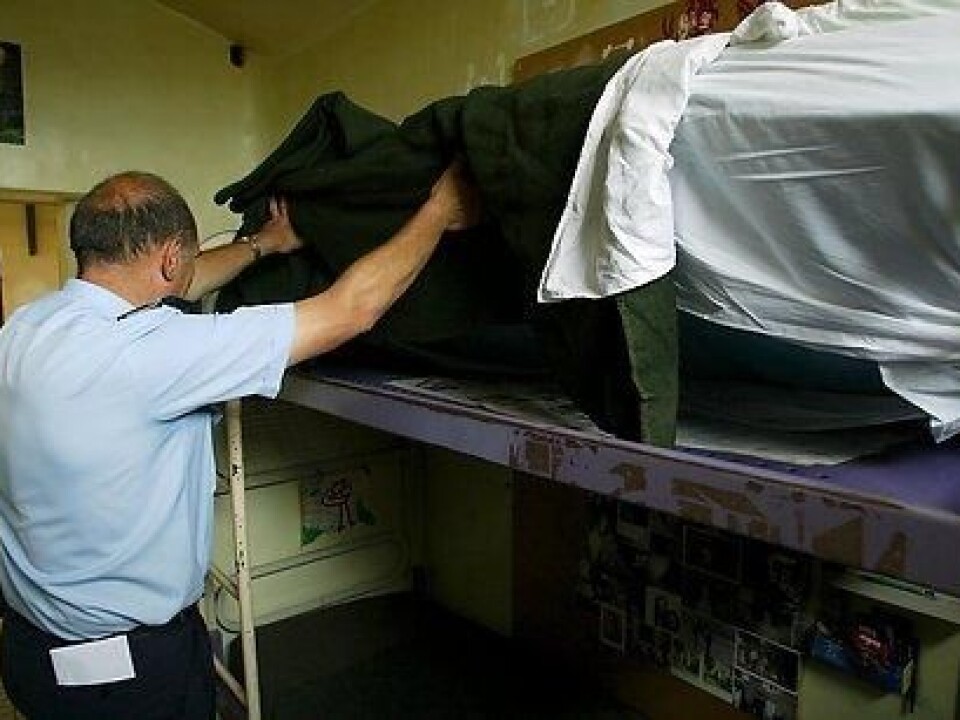
Cannabis makes inmates behave
Prison guards often turn a blind eye to cannabis smoking, because stopping inmates from smoking creates turmoil in prisons and can damage rehabilitation, says new Danish study.
Smoking weed is as illegal inside a prison cell as it is outside, but prison guards tend to let inmates get away with it.
Danish prison guards need to bend the strict cannabis regulations to simplify their working days, according to a new study.
“The guards bend the rules to maintain order. Many inmates have smoked cannabis for several years before they were imprisoned. They often smoke as a way of dealing with personal problems. If the guards take away their weed, they become restless and it could result in trouble,” says anthropologist Torsten Kolind, of Aarhus University’s Centre for Alcohol and Drug Research.
“There’s more peace and calm when the inmates are allowed to smoke. This is not to say that it’s okay to just give them a drug that makes them doze off, but many use it as a form of self-medication.”

Kolind and his colleagues have interviewed 22 prison guards, done fieldwork in open as well as closed jails and sent questionnaires out to prison staff.
The findings are published today in the book ‘Cannabisforbrug: Intervention og marked i Danmark’ (‘Cannabis use: Intervention and Market in Denmark’ – available in Danish only).
The study shows that prison guards don’t always follow the official rules when it comes to cannabis. Nor do they always punish the inmates in accordance with the drug regulations.
On the contrary: a full 78 percent of all prison guards in the study said they rather rely on their personal judgement and experience when making decisions about inmates smoking weed.
Guards sympathise with cannabis addicts
Prison is a tough experience, mentally, especially for weak drug addicts. The strong inmates often force the weak ones to store and smuggle their drugs. That way, it’s the weakest ones who get punished.
The guards have experienced that when inmates drink alcohol or take stimulants such as coke and amphetamine, it often causes unrest in the prison corridors. That’s why the guards are stricter about these kinds of drugs.
But that’s not the only reason why they sometimes turn a blind eye to inmates smoking weed.
Many of the guards also sympathise with the fact that some inmates simply cannot quit a sedative substance, says Kolind.
“The guards know the inmates. If they see inmates who suffer from personal problems such as loneliness sitting there in their cell smoking weed, they understand why they need it. They may then just tell them to shut the door because it smells of weed.”
Urine samples, drug-sniffing dogs, higher fences, roofed prison yards and body searches are effective ways of keeping drugs out of prisons. Yet cannabis continues to flow in.
Increased control harms work environment
Many prison guards in the study said that increased control is the only way to stop illegal drugs from entering the prisons. But they are ambivalent about that because they also believe that constant monitoring and punishment harms the work environment.
”Increased control will lead to prisons where they wouldn’t want to work, they said. The prisons would be filled with violence and an unpleasant atmosphere,” says Kolind.
The guards think that increased control would damage the relationship between guards and inmates. And if it reaches a point where the inmates lose all their trust in the staff, it gets harder to prepare them for a life outside prison when they get out, he adds.
Drug regulations hurt weak inmates
Denmark’s zero-tolerance policy against the possession and use of cannabis (see Factbox) also has the disadvantage that the rules hit hardest on the weakest of the cannabis-addicted inmates:
“Prison is a tough experience, mentally, especially for weak drug addicts. The strong inmates often force the weak ones to store and smuggle their drugs. That way, it’s the weakest ones who get punished,” he says.
The most common penalties for carrying cannabis are losing the right to go out, and losing the chance for parole.
“When we punish the weakest inmates like that, we reinforce their problems. And that makes it harder for them to function without committing crimes once they get out of jail. The guards are aware of that – and they care about rehabilitation.”
“All institutions break rules”
But it’s not only in prisons that staff members bend the rules. In all workplaces, people manipulate the rules to simplify their working days, says the anthropologist.
“In every kind of institution, people use their personal judgment when rules are implemented. It would paralyze an entire organisation if they didn’t.
“The guards act pragmatically to get through their working day, and that works better if they go gentle on the cannabis. It’s not an indication that the guards are not doing their jobs properly, but nobody would want to work in a place where they constantly have to punish and control.”
New guards are socialised
Just like in any other workplace, the seasoned guards ensure that new colleagues learn to relax if they start out being too strict.
“If a new guard does something out of the ordinary, he or she gets socialised. The old tell the new that they need to be less controlling in their behaviour, and then the new colleague winds down to avoid conflicts,” says Kolind.
“If, on the other hand, newly-recruited guards are too soft, the inmates will exploit them. It’s all about finding the right balance.”
What kind of prisons do we want?
If Danes are to hold on to their current prison system rather than moving towards US-type, maximum security prisons, the guards need to adopt some kind of everyday pragmatism in which they interpret the cannabis rules in a way that’s in accordance with their daily duties, says the anthropologist.
“What kind of institutions do we want in our society? In Denmark, we have a humanistic view on life, where we consider inmates on an equal footing with other people. As I see it, making our prisons too restrictive and controlling would not fit in with the Danish self-understanding.”
Kolind’s study forms part of a larger research project on social order in Danish prisons.
------------------------------------
Read the Danish version of this story at videnskab.dk
Translated by: Dann Vinther










